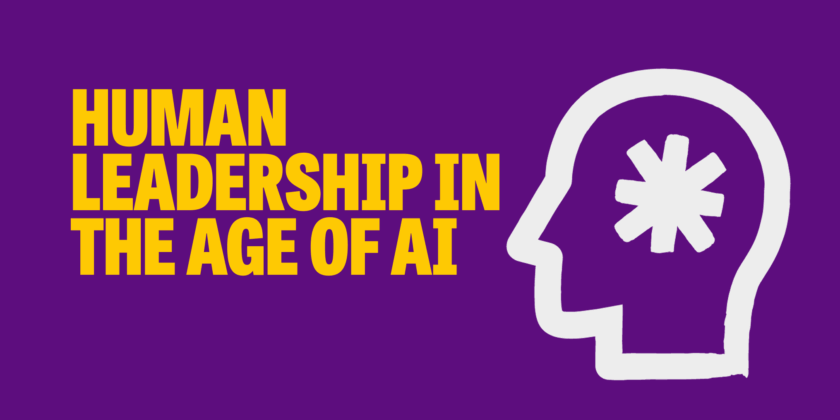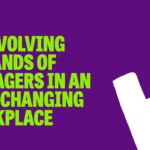The New Digital Imperative
We stand at a pivotal moment in workplace evolution. Artificial intelligence is reshaping how we work, make decisions, and lead teams. Yet amidst this technological revolution, a crucial truth emerges: the most sophisticated algorithms cannot replicate the human qualities that define exceptional leadership.
As AI tools become embedded in daily operations, from automated workflows to predictive analytics, organisations face a fundamental challenge. How do we harness technology’s power whilst preserving the human connections that drive innovation, trust, and meaningful work? The answer lies not in choosing between digital efficiency and human empathy, but in understanding how these forces must work together.
The leaders who will thrive in this new era are those who recognise that emotional intelligence, authenticity, and compassion aren’t luxuries – they’re strategic imperatives. Technology may process data at lightning speed, but it cannot inspire a struggling team member, navigate ethical complexity, or build the psychological safety that unlocks creativity.
Why Human Skills Matter More
The rise of AI has paradoxically heightened the value of distinctly human capabilities. Whilst machines excel at pattern recognition and data processing, they fall short in areas where leadership truly counts.
- Emotional intelligence remains the cornerstone of effective leadership. Understanding team dynamics, reading unspoken concerns, and responding with appropriate empathy cannot be automated.
- Authenticity builds the trust that technology alone cannot establish. Employees navigating uncertain times need leaders who communicate transparently about challenges, admit when they don’t have all the answers, and demonstrate consistency between their words and actions.
- Empathy enables leaders to see beyond metrics and understand the human impact of decisions. As AI reshapes roles and responsibilities, empathetic leaders can guide individuals through transitions, recognise when someone needs support, and ensure that efficiency gains don’t come at the cost of wellbeing.
These capabilities become more critical, not less, as workplaces digitalise. AI may flag performance issues, but only a human leader can have the nuanced conversation that uncovers whether the problem stems from skill gaps, personal challenges, or systemic barriers.
AI: Opportunity and Risk
Artificial intelligence presents organisations with unprecedented opportunities. It can automate repetitive tasks, surface insights from vast datasets, and free leaders to focus on strategic thinking. Yet these benefits come with significant responsibilities.
- The opportunities are compelling: AI-powered tools can identify skill gaps across teams, predict project bottlenecks before they occur, and personalise learning pathways for individual development. Leaders gain access to real-time data that once took weeks to compile, enabling faster, more informed decision-making.
- But the risks demand attention: Over-reliance on AI can erode human judgement. When algorithms drive decisions about hiring, promotion, or resource allocation, unconscious biases embedded in training data can perpetuate inequality. Efficiency gains that AI promises can quickly translate into dehumanised workplaces where people feel like a number on a spreadsheet rather than a human making true impact.
There are deeper concerns around trust and transparency. If teams don’t understand how AI systems reach conclusions, they may disengage from decisions that affect their work. When automation displaces roles, anxiety ripples through organisations, and no algorithm can address the emotional toll of workforce changes.
The ethical dimensions are equally pressing. Who ensures AI is used fairly? How do we balance productivity metrics with employee wellbeing? What happens when efficiency optimisation conflicts with inclusion goals? These questions require human wisdom, not computing power.
Leaders must approach AI as a powerful tool that amplifies their capabilities, not as a replacement for their judgement. The goal is augmentation, not automation of leadership itself.
Technology Meets Empathy
The most successful organisations in the AI era will be those that consciously blend digital capabilities with human-centred leadership. This isn’t about limiting technology, it’s about deploying it purposefully whilst strengthening the human elements that drive engagement and performance.
- Start with people, not platforms: Before implementing any AI solution, ask how it will improve employees’ working lives. Will it reduce administrative burden, enabling more time for meaningful work? Or will it create surveillance concerns that erode trust? The best digital transformations begin with understanding team needs and concerns.
- Champion transparency: When AI influences decisions, whether in performance reviews, resource allocation, or operational planning, explain how these systems work and what data they use. Demystifying technology builds confidence and allows teams to engage constructively with new tools.
- Prioritise wellbeing alongside productivity: AI can optimise workflows, but leaders must ensure efficiency gains don’t translate into unsustainable workloads. Monitor for signs of digital fatigue, create boundaries around always-on connectivity, and model healthy technology use.
- Foster inclusion through design: Ensure AI implementations consider diverse perspectives and needs. Involve team members from different backgrounds in testing and feedback. Regularly audit systems for bias and be prepared to override algorithmic recommendations when human judgement suggests a better path.
- Cultivate adaptability and continuous learning: As AI reshapes work, people need ongoing support to develop new skills. Create psychologically safe environments where questions are welcomed, experimentation is encouraged, and failure becomes a learning opportunity rather than a career risk.
The organisations that get this balance right share a common characteristic: they view technology as a means to enhance human potential, not replace it. Their leaders use data to inform decisions whilst remaining attuned to factors that numbers alone cannot capture.
LTT’s Framework for Human Leadership in the AI Era
At Let’s Talk Talent, we’ve developed a comprehensive approach to help leaders navigate the intersection of technology and humanity. Our framework rests on four pillars that enable organisations to embrace digital innovation whilst strengthening their human core.
- Assess Before You Act: Effective AI integration begins with understanding your current leadership landscape. We work with organisations to evaluate how well leaders balance technological proficiency with essential human skills. Through our coaching and assessment services, we identify where leaders excel and where targeted development will yield the greatest impact. This diagnostic phase ensures transformation efforts address actual needs rather than assumed gaps.
- Develop Human-Digital Fluency: Tomorrow’s leaders need dual competencies: technological literacy and enhanced emotional intelligence. Our people development strategies equip leaders to make informed decisions about AI adoption whilst deepening their capacity for empathy, authentic communication, and ethical reasoning. We help leaders become informed consumers of technology who can ask the right questions and make people-centred choices.
- Embed Ethics and Inclusion: AI governance cannot be an afterthought. We support organisations in establishing frameworks that ensure technology serves everyone fairly. This includes developing protocols for algorithmic transparency, creating diverse AI oversight teams, and building feedback mechanisms that surface concerns before they become problems. Our approach helps leaders proactively address bias, protect privacy, and maintain trust throughout digital transformation.
- Build Resilient, Adaptive Teams: The pace of technological change requires teams that can evolve continuously. We help organisations create cultures where learning is constant, psychological safety is prioritised, and change is navigated collaboratively. Through targeted interventions, we strengthen the team dynamics that enable successful adaptation whilst maintaining wellbeing and engagement.
This framework recognises that digital transformation is fundamentally a human challenge. Technology is the tool; leadership is the catalyst that determines whether that tool drives positive outcomes.
Lead with Humanity in the Age of AI
The future of work isn’t about choosing between human leadership and artificial intelligence, it’s about consciously integrating both to create workplaces where people thrive and organisations excel.
As AI continues reshaping the business landscape, your leadership approach will determine whether technology enhances or diminishes your team’s experience. The organisations that emerge strongest will be those where leaders combine digital fluency with unwavering commitment to empathy, authenticity, and ethical practice.
Lead with humanity – equip your team for the age of AI with LTT. Our transformation support helps you develop the leadership capabilities and organisational frameworks that balance innovation with inclusion, efficiency with wellbeing, and technological advancement with human connection. So check out our new and improved HR strategy whitepaper which will get you started.
Or simply Contact Let’s Talk Talent today to run a digital-human leadership audit and discover how we can support your journey toward human-centred leadership in the AI era.



